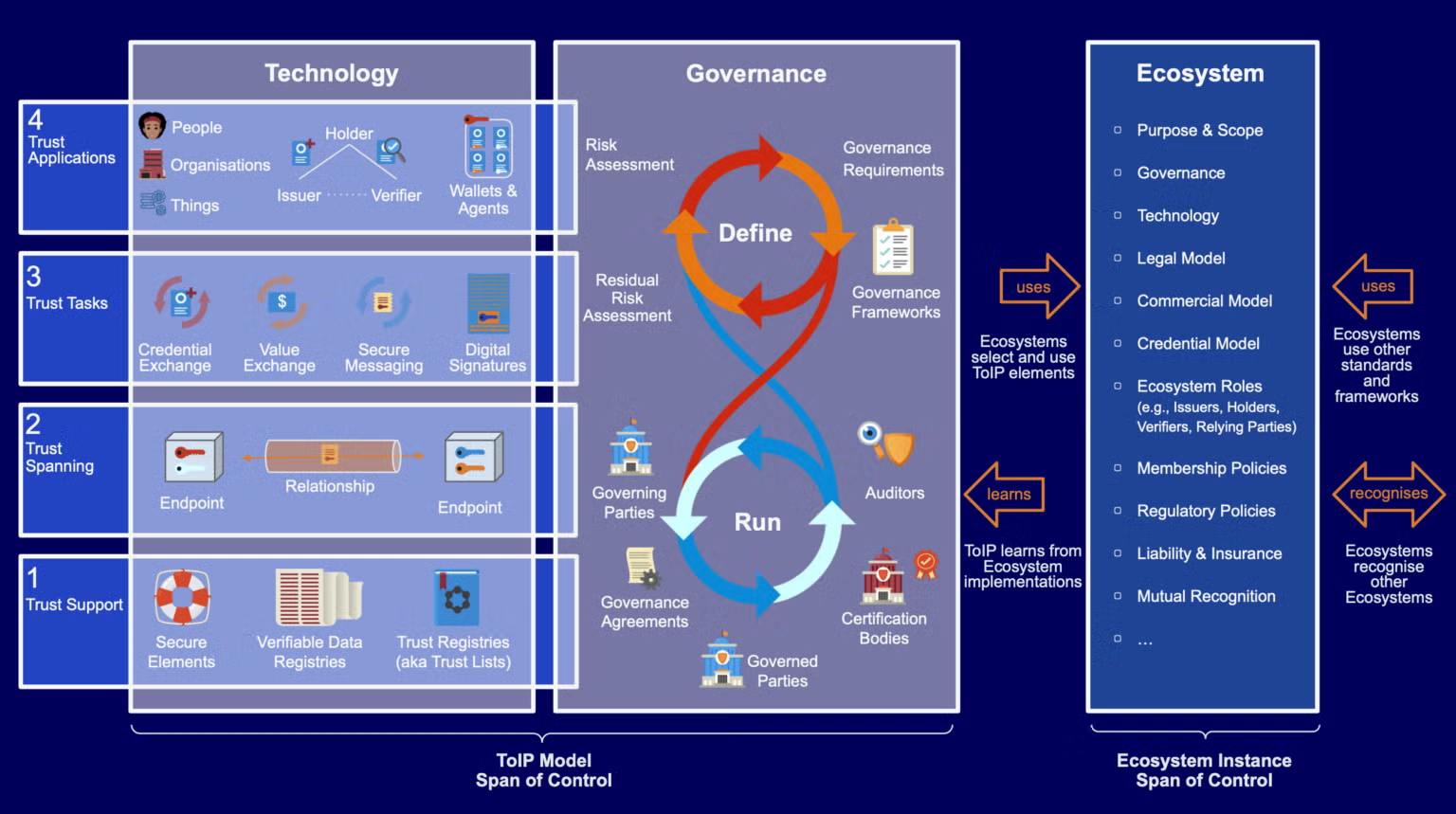Governance is key to controlled data sharing
Ein gut konzipiertes digitales Identitäts-Ökosystem bietet zahlreiche Vorteile:
- more efficient resource utilization
- reduced carbon emissions
- increased competitiveness
- enhanced economic value
- reduction of fraud and data errors
For data owners, such a system enables targeted sharing of selected ERP data with external parties - in compliance with data protection and without full disclosure.


Challenges of controlled data sharing
Implementing controlled data exchange brings complex issues:
- How are access requests and access rights properly be verified?
- How can compliance with necessary conditions be checked?
- Which problems might occur and how can they be solved?
- How to overcome legal challenges?
These aspects require both technological and process-based solution approaches. As the number of participants increases, technical and legal complexity grows exponentially. This makes it difficult to control all relationships within the ecosystem and necessitates comprehensive legal design.
Development of Governance Guidelines
Organizations such as the Trust-over-IP (ToIP) Foundation and the iShare Foundation are working on cross-sector guidelines for appropriate governance in digital ecosystems. The ToIP Foundation has developed a comprehensive framework addressing technical, legal, and governance aspects of digital trust ecosystems.
An effective governance model for digital identity ecosystems is crucial to ensure trust, security, and interoperability while promoting innovation and economic growth.

ToIP-model of the Trust-over-IP Foundation (https://trustoverip.org)

Governance of the European Cooperative IDunion SCE
IDunion is a European Cooperative Society (SCE) that provides a distributed network as a trust anchor for identity-based use cases. The members consist of leading industry experts for digital identities who collaborate in a compliant and democratic structure.
IDunion's governance model is based on a clearly defined set of rules anchored in the statutes and a supplementary regulatory framework. Central elements are:
- General Assembly:Each member has one vote, appoints experts for technology and compliance committees and elects members of the Supervisory Board
- Supervisory Board appoints and controls the Executive Board
- Management Board is responsible for network operations and promotes cooperation between members
Special Features
- Cross-industry expertise: Members bring expertise from various industry sectors, promoting the development of specific use cases.
- Democratic decision-making: The "one vote per member" principle ensures balanced participation of all members.
- Specialized committees: Technology and compliance committees enable informed decision-making in complex specialist areas.

This governance model aims to ensure effective, transparent, and fair collaboration within the IDunion network while considering the interests of all stakeholders.
Antitrust-conformant collaboration
Cooperative members can contribute to IDunion in three essential ways:
- Expert Participation in Specialist Committees
- Delegation of experts to technology and compliance committees
- Active promotion of the further development of IDunion SCE
- Topic-Specific Collaboration
- Engagement in working groups on relevant topics
- Cooperation with other members to develop solutions
- Technical Infrastructure Participation
- Operation of a node in the distributed IDunion network
- Contribution to the stability and decentralization of the infrastructure
These participation opportunities allow members to optimally contribute their specific competencies and resources to the cooperative while benefiting from collective expertise.
An Innovative Synthesis of Open Source and a legally binding structure
Open source projects have established themselves as an effective method of software development:
- Global developer participation through intrinsic motivation
- Transparent development processes for quick problem-solving
- Optimization of resource use by avoiding redundant work
Despite their strengths, open source projects often have limitations:
Limited possibilities for liability assumption
Lack of structures for commercialization
Absence of service level agreements for users
IDunion overcomes these limitations by establishing a European Cooperative Society (SCE). This legal form combines the benefits of open source with a robust organizational structure:
Non-investment nature: No sale or speculative use possible
Collective ownership: Each member receives a share
Member-centric purpose: Focus on member interests and economic benefits
Legally compliant collaboration: Enables cooperation while adhering to competition law
Democratic technology operation: Jointly operated technology according to democratic principles
Solid legal position: Limited liability and ability to conclude legally binding contracts
Through this unique structure, IDunion preserves the innovative power of open source projects while providing a robust legal and organizational framework for sustainable collaboration and commercialization.
Das von IDunion gewählte Governance-Modell zeigt die entscheidende Rolle einer gut strukturierten Governance in digitalen Identitäts-Ökosystemen. Durch die Kombination der Stärken der Open-Source-Entwicklung mit den rechtlichen und operativen Vorteilen einer Europäischen Genossenschaft hat IDunion einen Rahmen geschaffen, der Zusammenarbeit fördert, Konformität sicherstellt und die Interessen seiner Mitglieder bedient. Dieser Ansatz ermöglicht nicht nur eine kontrollierte Datenfreigabe, sondern ebnet auch den Weg für sicherere, effizientere und nutzerzentrierte digitale Identitätslösungen in einer zunehmend vernetzten Welt